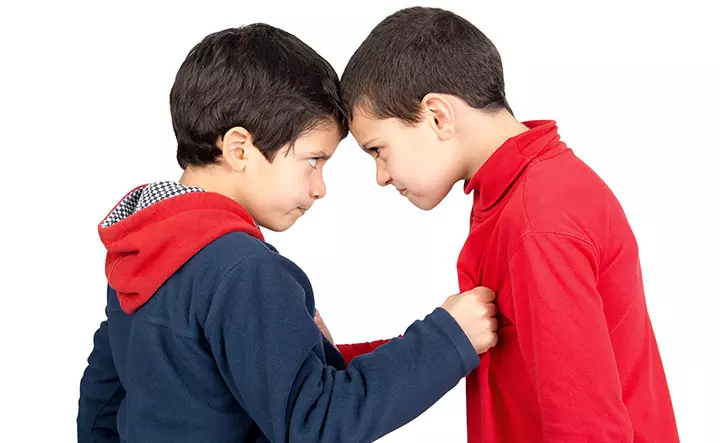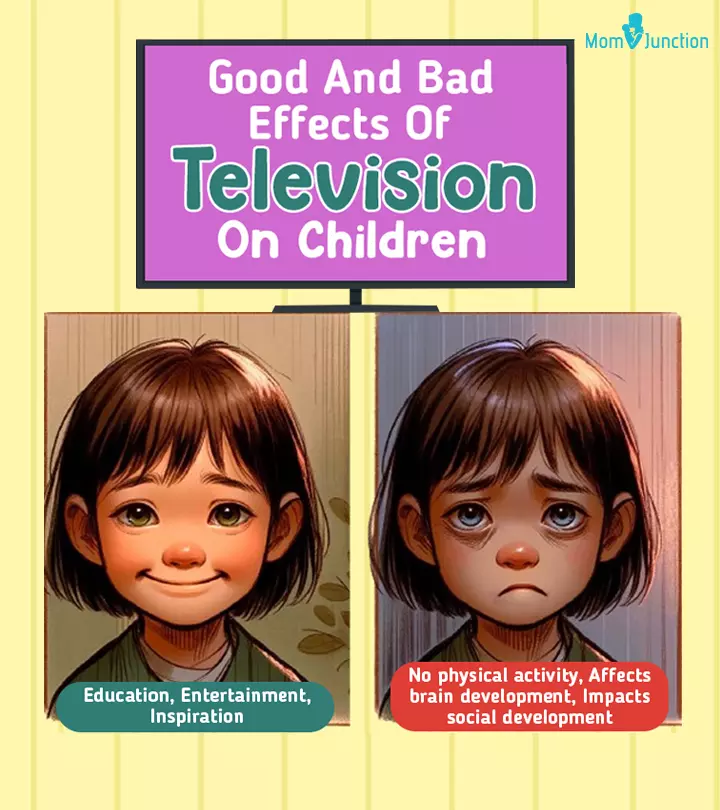
Image: Created with Dall.E
The benefits of technology and media are numerous for children as they make learning fun and an engaging experience for them. However, to maintain a healthy balance, it is crucial for parents to think about both the good and bad effects of television on children. Understanding the difference will help parents make informed decisions about their children’s screen time and what they see to ensure the benefits of technology while minimizing potential risks.
A Pew Research Center study interviewed parents to evaluate children’s engagement with specific digital devices. The study shared that 88% of parents with a child under 12 acknowledged that their child engages with television regularly. Additionally, 74% of parents with a child aged two or younger stated that their child uses or interacts with a television somehow.
While television sets are an inseparable part of our lives, parents may want to know how much TV time children should be allowed and what kind of TV shows are appropriate for their children’s age group.
Read this post to learn more about the positive and negative effects of television on children and the role of parents in helping children get the best out of their TV time.
Key Pointers
- Television can have a positive impact on children when they are exposed to appropriate content such as educational programs and shows on different sports and cultures.
- However, addiction to TV shows can lead to a reduction in social interactions and physical activity, potentially resulting in obesity and vision problems for children.
- Additionally, excessive TV time can negatively affect a child’s brain development and increase the risk of unfavorable behaviors and habits.
- To protect their children from the negative effects of television, parents can choose appropriate shows, limit screen time, and encourage physical activity.
Positive Effects Of Television On Kids
The television is not bad. When exposed to the right shows or programs, your child can learn useful things. Research indicates that watching TV can have a positive impact on children. It can help them change their behavior and attitude for good (1). Here are some more ways in which TV can have a positive influence on kids.
1. Educational content
A few television channels are dedicated to creating educational programming and informative content for the audience, especially children. Sesame Street, for example, is one such program that is aimed at preschoolers.
There are a few channels that broadcast only educational content covering subjects like art and craft, science, history, geography, and math. TV is also a great medium that exposes children to different languages around the world.
Allowing your children to watch news channels, with a little guidance, will help them stay updated with the current affairs and names of significant people in the world.
2. Entertainment
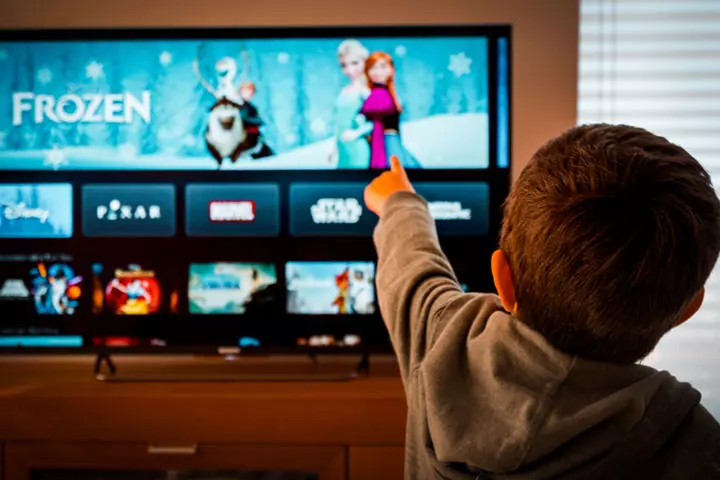
Image: Shutterstock
The sounds and colorful images on the screen appeal to children and also retain their attention. From movies to cartoon shows, there are several programs to keep children engaged.
However, make sure that the content is appropriate for your kids based on their age and level of understanding.
3. Sports
Encourage your kids to watch different sports like tennis, soccer, baseball, and basketball, by co-viewing with them. Tell them about the gameplay, rules and other interesting facts about the sport. If they show interest in any, encourage them to play the game or sport. On days when outdoor play is not possible, let your child play their favorite sport on a video game. When indulged in a time-bound manner, the effects of video games on children are quite positive.
4. Exposure to different cultures
The TV can help your child to learn about different countries and teach them about various cultures in the world. With the right choice of programs, your child might learn about various people around the world, their traditions, lifestyles, and cultures.
5. Television might inspire
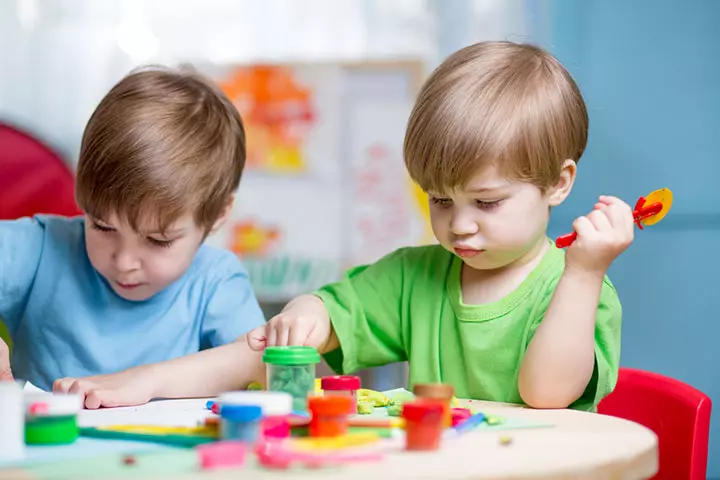
Image: Shutterstock
TV shows aimed at young children and adolescents are not only educational but also inspiring. Educational TV programs encourage children to try new things. For example, a TV show about creative fun can inspire a child to try something new with clay, paints, or paper. Likewise, a documentary about famous scientists, artists, and other public figures can also inspire them to do good deeds or achieve something big in life.
6. 3D TV and programs
3D technology has changed the way we experience television. 3D television programs and movies offer an enhanced experience for kids. Although the popularity of 3D TV has been on the decline in the recent past, there are still a few networks offering educational programs in 3D.
The American OptometriciA specialized healthcare profession which involves examination of the eyes and related structures Association has confirmed that 3D can be viewed by most children (2). If your child has trouble, consult a medical professional.
Your kids can reap all these benefits from watching TV or the internet only when you guide them to watch the right shows for a limited time.
The American Academy of Pediatrics recommends limiting screen time and the types of media that children aged six and older watch. For children between the ages of two and five years, screen time should be limited to one hour per day and must only include high-quality programs (3).
Digital media influence can quietly take over your children’s lives if you are not cautious. The “just one more hour” could extend if not corrected at the nascent stageiEarly stage of development or recently coming into existence .
[ Read: Teen Social Media Addiction ]
Negative Effects Of Television On Children
TV affects children negatively as well. Unfortunately, the adverse effects seem to outnumber the positive ones when you do not pay attention to them.
Here are a few ways in which TV can be a bad influence on your children.
7. Curbs physical activity
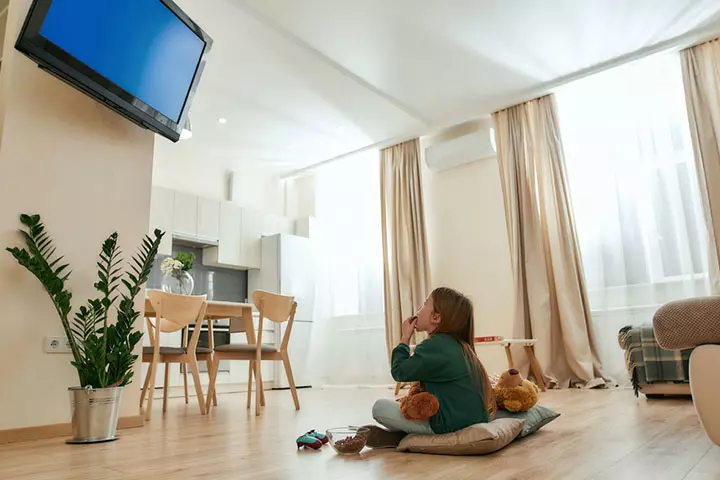
Image: Shutterstock
Screen addiction reduces the amount of physical activity in children. Sometimes, they refuse to do anything else but watch TV all day.
- Lack of proper physical activity and too much screen time can lead to vision problems.
- Research has also indicated that there is a direct connection between TV time and obesity in kids (4). The American Academy of Pediatrics identifies TV viewing for more than 1.5 hours as an identified risk factor for obesity in kids aged four to nine. The risk of being overweight increases fivefold if teens watch TV for more than five hours daily compared to those who watch for 0 to two hours. Children tend to watch more TV if it is placed in their bedrooms, and the problem is intensified by food advertising and snacking while watching TV (5). A sedentary lifestyle and obesity may also increase cardiovascular health risks in the future (6).
8. Impacts social development
Kids who watch a lot of TV do not have time to play or develop social skills. Less or no interaction with peers can affect their social development. TV eats away the time they get to interact with other children in their social circle, which may affect their knowledge and understanding of social interactions and behavior.
9. Affects brain development and behavior
Pediatrician and neonatologist Dr. Neema Shrestha says, “Excessive use of TV/media (>2 hours/day) to watch poor-quality content has been found to lower cognitive development in children. It has been shown to cause language delays, poor reading and math skills, and short-term memory in children between two to five years.”
TV shows may be educational, but excessive watching can have negative cognitive effects and behavioral effects in children, according to studies. The first couple of years in your child’s life are very important for brain development.
- Researchers found that prolonged TV viewing might lower cognitive abilitiesiAlso known as general intelligence, cognitive abilities or skills are needed to carry out a task related to short-term memory, early reading, math skills, and language development (7).
- Another study by The John Hopkins University states that toddlers who watch television for more than two hours a day can have behavioral problems (8).
Even educational shows like Sesame Street and Dora the Explorer are recommended for children not until pre-school age.
10. Exposure to vices
Finding age-appropriate and children-friendly content for children can be challenging for parents. Stuart Fleming, a father, recounts the challenges he and his wife faced while looking for suitable programs for their son. He mentions, “My son (Master 4) didn’t have any screen time until after his second birthday, and even then, it was kept to about 30 minutes each week. When his mother and I started searching for age-appropriate programs, we were surprised by how few – both new releases and old favorites – were free from rapid-fire cuts, unwarranted aggression, mean behavior, or inane storylines (i).”
This difficulty in finding suitable content becomes critical because inappropriate material on TV can impact children negatively. You may also not always be able to control what your kid watches on the TV.
- Early exposure to inappropriate content that has sex, alcohol, and drugs, could bring up questions in children, the answers to which may be too complicated for them to understand. The worst part is that early exposure can even give them a distorted view of these elements.
- The violence portrayed in a “positive” light in superhero movies and the like gives them an idea that it is “okay” to be violent. So, kids watching TV shows based on superheroes may start believing that violence is not bad. Additionally, getting exposed to this type of content can gradually make your child desensitized to real-world violence and aggression, thus impacting their empathic behavior and social interactions.
- It may even encourage violent and aggressive behavior in some kids, which can be detrimental to their social development (9). In some children, this behavior may surface immediately, while in some, it could come up during the later years.
“Television programs showing fast-paced or violent content can negatively impact a child’s behavior. Sometimes, children’s programs may also contain content that may not be appropriate for their age,”
observes Dr. Shrestha.
 Research finds
Research finds11. Gives a distorted view of the world
Television may have psychological effects and might lead to the “mean world syndromeiA phenomenon in which people may perceive the world to be more harmful due to long-term exposure to violence ” in kids and teenagers (10).
- Movies and other television shows may exaggerate reality and create extremely violent scenes online, which may be terrifying for kids.
- The amount of guns and violence exposure through TV may give them the impression that the world is an unsafe place for them.
- At the same time, animated and cartoon shows, which underplay the effects of violence, may desensitize kids to real-world events.
12. Consumerism

Image: Shutterstock
Another bane of television is consumerismiA consumer behavior characterized by a desire for materialistic things and a better lifestyle. . The number of ads that a child sees on TV exposes them to a variety of brands and products that they may not need.
- Commercials encourage kids to consume unhealthy foods and drinks.
- Children begin to believe that fast food, ice creams, and carbonated drinks are good.
- Parents become the victims of consumerism as kids insist on buying something that they saw on TV. They are forced to spend money on things that their children want but do not need.
13. Poor Academic Performance
Excessive television watching can also lead to poor academic performance in children as a significant amount of their time might get wasted watching TV, which detracts from their study time. It may eventually lead to unfinished homework and decreased interest in studying. A study conducted on the students of Diamond Public School in India showed that children who spent a considerable amount of time watching TV had poor academic performance in class and school (11).
What Can Parents Do?
Parents have to take a stand when it comes to television. If you want to protect your children from the damaging effects of television, here is what you can do.
1. Choose The Right TV Shows
The first step is to figure out what shows are appropriate for children. You will have to do some research to understand the content and the message that the show sends out to the audience. Do not pick a show just because it is for children. Keep in mind the following factors before you decide what to watch for kids:
- The content of the show must be appropriate for your child’s age.
- Pick shows with shorter duration. The longer they watch, the more the chances of them getting addicted.
- Check the tone and pace of the show as you would not want your kids to watch an energetic show before going to bed.
- Do not let them watch ads as the effects of advertising on children are profound. Kids are naïve and commercials can be manipulative as their primary goal is to sell products by convincing their impressionable audience.
- Encourage them to watch educational programs by watching them yourselves.
 Point to consider
Point to consider2. Limit TV Time For Kids
The number of hours children spend watching digital media are increasing at an alarming rate. While you may not be able to control how much TV your kids watch outside, you can surely limit it at home. Here’s how.
- No television during mealtime: Do not allow your kids to watch TV while they are eating. Ensure that you have dinner together, if possible, at the dinner table with no TV in the background.
- Remove TV from the bedroom: TV in bedrooms is a bad idea, especially for kids as prolonged exposure to screens can affect their sleeping habits and cause sleep disturbances.
- TV is not a babysitter: It is common for parents to use the television as a babysitter when they want to do something without being disturbed by their kids. When you are busy, you may not be able to monitor what the kids are watching, and that can expose them to inappropriate content.
- Television in the background: It is common to leave the TV turned on in the background when you are busy in the kitchen, doing the laundry or working from home. That will only draw the child’s attention to it. Moreover, excessive television viewing can have negative effects on children’s attention span, making it difficult for them to focus on tasks and engage in creative play. So, do not switch on the TV unless you want to watch something.
- Set TV time rules for school days: Chalk out specific TV time for kids for weekdays and weekends and stick to them. That will prevent them from watching too much TV on any given day.
3. Make It A Family Activity
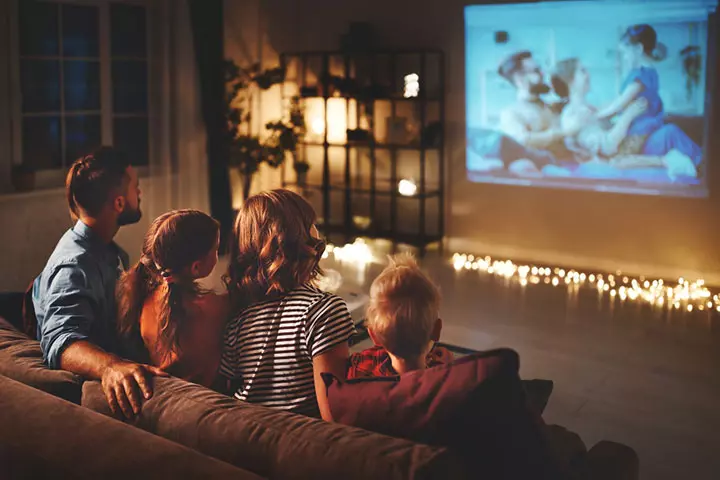
Image: Shutterstock
Try to make watching TV a fun family activity, instead of a means to pass the time. That will discourage your children from watching it when they are bored or alone at home.
4. Encourage Physical Activity
One more thing you could do is encourage your children to go out and play. This might help in shifting their attention away from the digital media. If your kids are resisting, then try these:
- Organize play dates with your neighbor’s kids.
- Participate with them in some outdoor games.
- Encourage them to participate in games and sports at school.
- Reward them if they voluntarily ditch the TV to play outdoors.
 Quick tip
Quick tipRole Of Television In Your Kid’s Life
Let’s face the fact that television is not going anywhere anytime soon. So, not buying a TV to keep your child ‘safe’ does not guarantee that they will not be exposed to it. They can watch TV at school, at a friend’s house, or at any other place.
But this does not mean you cannot control the influence of television on your children. As a parent, you can decide how much TV your kid sees. If your kids are old enough to understand, then explain to them why you are limiting the screen time and how it can affect them; this might reduce the resistance. You can also monitor their programs and encourage them to choose programs with positive messages and educational content. You can also be a good role model by watching these programs with them, thus, fostering healthier viewing habits.
Frequently Asked Questions
1. How can television impact child development?
As mentioned earlier, television can affect a child’s brain development and influence their behavior. It can curb their physical activity, social interaction, and cognitive development in some cases.
2. Can babies and toddlers watch TV?
A baby watching TV might seem amusing, but you need to be cautious. Experts recommend that children under two years of age should not be exposed to TV, as it can be detrimental to their cognitive, social, and physical development. According to the American Academy of Pediatrics, parents allow more than 40% of infants and babies to watch TV. Just because the show is designed for infants and toddlers does not mean it is right for them (12).
3. What is media violence?
Media violence is the portrayal of violent and aggressive behavior on screen for entertainment. The aggression is usually led by a human or a human-like character on screen (13).
4. How can television be used as an educational tool?
According to research, television can have positive and negative effects on education. Studies have found that preschoolers who watch educational programs tend to perform better in school, exhibit less aggression, and value academics. Also, children who watch less TV before the age of three have better math and reading skills by the age of six. However, shows, such as Power Rangers and Teletubbies may harm children’s language, reading, and math abilities (14).
5. How does television influence attitudes towards gender roles?
Books, TV, movies, and songs influence children’s understanding of gender roles. What they see and experience shapes their beliefs. For instance, if they see a male doctor and a female nurse, they may believe that only men can be doctors and only women can be nurses. Parents, friends, and media can further strengthen these biases and stereotypes. If children continue to be exposed to these attitudes, they will become a part of their outlook (15).
6. What are some ways television can be used to facilitate social interaction?
Television can facilitate social interaction, as most family members watch it together in shared spaces. Watching TV is a family activity, and parents use it in conjunction with social interaction. Meanwhile, children participate in different leisure activities (16).
Television is a vital part of our lives nowadays. However, when children start to indulge in watching too much TV, most parents wonder about the good and bad effects of television on them. While TV is a source of entertainment and a great way to engage in informative and educational content, sometimes it could also negatively impact a child’s well-being. Hence, it is important for you as a parent to set a few rules, such as establishing a fixed screen time, choosing the right kind of shows for children, and encouraging physical activity. Remember that television can do good for your child when using it with caution and appropriate parental supervision.
Infographic: Tips For Parents To Minimize The Effects Of TV On Children
You don’t want your child to be in front of the TV all the time, but it helps keep them busy while you do your chores. So what can you do to minimize the negative impact of television? Scroll through this infographic for some helpful tips. Illustration: Momjunction Design Team
Is excessive TV watching detrimental for your child? Get insights into the potential pitfalls and advantages of television viewing for youngsters in this comprehensive video.
Personal Experience: Source
MomJunction articles include first-hand experiences to provide you with better insights through real-life narratives. Here are the sources of personal accounts referenced in this article.
i. Lockdown changed my view on children’s television (and helped me be a better parent)https://medium.com/stride-writing/lockdown-changed-my-view-on-childrens-television-and-helped-me-be-a-better-parent-df9e9691a466
References
1. Changing behavior through TV heroes; American Psychological Association
2. 3D is OK for Most Kids, says the American Optometric Association; Consumer Reports
3. Screen time and children; American Academy of Child and Adolescent Psychiatry
4. Steven L. Gortmaker; Television Viewing as a Cause of Increasing Obesity Among Children in the United States, 1986-1990; JAMA Network
5. Constantly Connected: How Media Use Can Affect Your Child; American Academy of Pediatrics
6. Limit screen time among kids, experts caution; American Heart Association
7. Screen time and young children: Promoting health and development in a digital world; Pediatrics and Child Health
8. Childhood TV Viewing a Risk for Behavior Problems; Johns Hopkins Bloomberg School of Public Health
9. TV Violence and Children; American Academy of Child and Adolescent Psychiatry
10. Media Violence; Pediatrics- The Official Journal Of Pediatrics
11. Bharat Dhiman;Negative Impact of Television Viewing on Academic Achievements of Students: A Case Study of Subhash Nagar; SSRN Electronic Journal (2022)
12. Kids and Digital Media; C.S. Mott Children’s Hospital
13. L. Rowell Huesmann; The Impact of Electronic Media Violence: Scientific Theory and Research; NCBI(2009)
14. Television Viewing: Teacher, Trouble-Maker or Tool???; The Center for Parenting Education
15. The influence of television on children’s gender role socialization; Lewis University
16. Darby Saxbe et al., Television as a Social or Solo Activity: Understanding Families’ Everyday Television Viewing Patterns; Communication Research Reports (2011)
17. The Benefits of Watching TV With Young Children; Child Mind Institute
18. Easy Ways to Encourage Your Kids to Get Active; Academy of Nutrition and Dietetics
Community Experiences
Join the conversation and become a part of our nurturing community! Share your stories, experiences, and insights to connect with fellow parents.
Read full bio of Dr. Sadhvi Mythili
- Dr. Neema Shrestha is a pediatrician with a special interest in the field of neonatology. She completed her graduation in medicine at Kasturba Medical College, Diploma in Child Health at D.Y. Patil University, post graduation in Pediatrics at Nepal Medical College and Fellowship in Neonatology at Sir Ganga Ram Hospital, New Delhi. Dr. Shrestha has an overall experience of five years and currently works at NICU in Grande International Hospital, Kathmandu, Nepal.
 Dr. Neema Shrestha is a pediatrician with a special interest in the field of neonatology. She completed her graduation in medicine at Kasturba Medical College, Diploma in Child Health at D.Y. Patil University, post graduation in Pediatrics at Nepal Medical College and Fellowship in Neonatology at Sir Ganga Ram Hospital, New Delhi. Dr. Shrestha has an overall experience of five years and currently works at NICU in Grande International Hospital, Kathmandu, Nepal.
Dr. Neema Shrestha is a pediatrician with a special interest in the field of neonatology. She completed her graduation in medicine at Kasturba Medical College, Diploma in Child Health at D.Y. Patil University, post graduation in Pediatrics at Nepal Medical College and Fellowship in Neonatology at Sir Ganga Ram Hospital, New Delhi. Dr. Shrestha has an overall experience of five years and currently works at NICU in Grande International Hospital, Kathmandu, Nepal.
Read full bio of Sagari Gongala
Read full bio of Swati Patwal
Read full bio of Apoorva K











